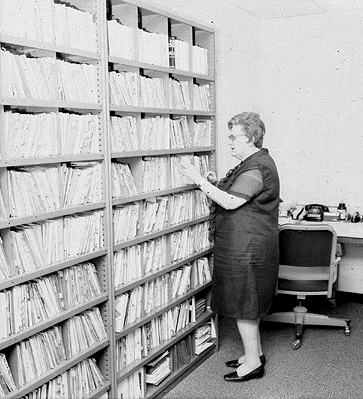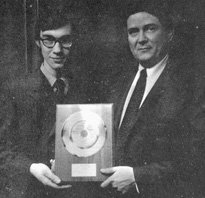
©
1999-2026
Man From Mars Productions
 |
 |
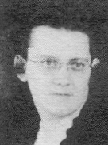 WDRC's Bertha Porter in 1945 |
While seldom heard on the air, the influence of Bertha G. Porter was widely felt off the air at WDRC for almost a quarter century. Born in Springfield,
MA on July 24, 1915, Bertha joined WDRC on June 4, 1945 helping
out in bookkeeping and on the telephone switchboard. It was the
heyday of network radio so local stations didn't play much recorded
music. But Bertha was put in charge of WDRC's collection
of 30,000 records. As record librarian, and later music director,
her ears were keenly attuned to the tastes of contemporary America
(her own favorite performer was the late Buddy Clark). Bertha segued
easily from the middle-of-the-road music aired during the station's
CBS affiliation into rock and roll. |
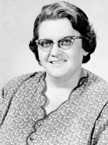 WDRC's Bertha Porter in 1964 |
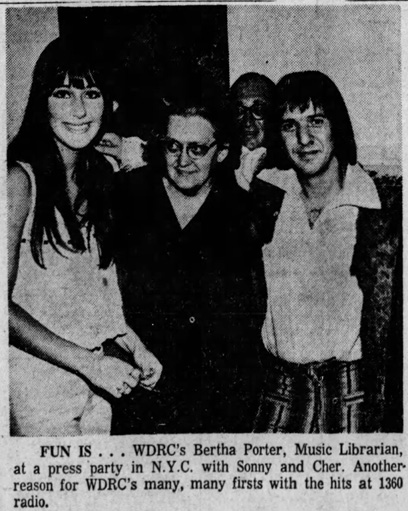 Hartford Courant - September 11, 1965 |
For years Bertha had a weekly chore every Thursday - telephoning some three dozen Connecticut record retailers to collect the sales data she depended on to formulate the Big D Swinging Sixty Survey. The What's Doing 'Round Connecticut column on October 22, 1963 said of Bertha:
Hartford and Cleveland were secondary markets with reputations for being good places to test new record product, so a few minutes with Bertha was a coveted prize for promoters from labels large and small. Her choices of music resulted in national recognition and at least 15 gold records for being the first to play singles that went on to become national hits. Porter was held in very high esteem by longtime Billboard Magazine radio editor Claude Hall. In the November 23, 1968 issue he called her the "queen of music directors," quoting Bertha's philosophy for picking new records:
|
|
 WDRC music director Bertha Porter receives a gold record from Al Khoury of Capitol Records for her efforts in making Al Martino's I Love You Because, a national hit (Billboard Magazine, August 3, 1963) |
Among the awards she received: summer
1963 -
gold record for Al Martino's "I Love You Because" |
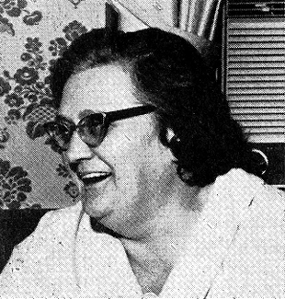 Bertha Porter in November 1970 |
 WDRC's Charlie Parker and Bertha Porter receive a public service award from the March of Dimes |
In her 2001 book, Invisible Stars: A Social History of Women in American Broadcasting, historian Donna L. Halper quoted WDRC program director Charlie Parker on Bertha's work ethic:
Bertha was such a fixture at WDRC that many people were shocked when she quit. Cash Box Magazine reported:
|
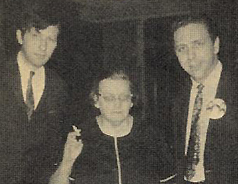 April 1967 - Bertha with WDRC's Don Wade (left) and WABC's Bob Lewis (right) |
| Click
here for an article on Bertha published in Cash Box magazine. |
|
On August 6, 1969, radio and record industry luminaries gathered in the Hartford Hilton's Terrace Room to honor Bertha at a retirement party after 24 years at Big D. Her final years were quite sad. For a time Bertha moved to Boston and worked as a singles buyer for a record company. She later worked for a toy manufacturer in the Boston area. One day her subscription to The Rudman Report, a weekly record sheet, was returned marked "deceased." Kal Rudman called Atlantic Records executives Bob and Jerry Greenberg who tracked down the story. Bertha G. Porter died on January 14, 1978, at the age of 63, having spent three years at the Municipal State Hospital in Springfield with heart trouble. There was no public funeral and no one at WDRC knew of her death until after she was buried. |
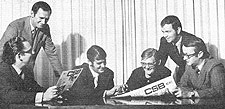 WINF's Uncle Jay Edwards, WDRC's Jim Jeffrey, Joey Reynolds, Bertha Porter, Dick Robinson & Ken Griffin review Connecticut School of Broadcasting newsletter, 1969 |
|
|
Jim English succeeded Bertha as WDRC's music director. He was a local who had been in the first graduating class of Dick Robinson's Connecticut School of Broadcasting in 1965 (along with classmate Frank Holler). After graduation he went on to accounting school before pursuing radio employment. Jim started at Big D in September 1968, working in the Traffic Department. In June 1969 Charlie Parker told him he would be replacing a living legend. Jim had exactly one week to learn how the music library functioned. It was a daunting task for him to learn the names of all the record promoters Bertha had been meeting with for so many years. He also had to quickly learn how to do the callout research necessary for the Big D Big Sound Survey. He believes Bertha's sudden retirement was not her own choice. |
|
Jim continued the tradition of collecting gold records. In his years as music director he racked up a couple of dozen including:
|
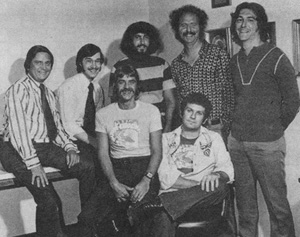 "American City Suite" goes gold in 1972 on ABC/Dunhill. (Front l-r:) Dunhill's Dick Lempke and Tom West. (Back l-r:) Program director Charlie Parker, music director Jim English, overnight host Barry Grant, Terry Cashman and 7PM-midnight host Gary DeGraide |
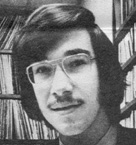 WDRC's Jim English |
Jim English spent 12 years at WDRC. The radio industry was changing and he could see his days as an off-air music director were limited. In October 1980 the ax fell and Jim was one of several staffers let go in an economic cutback. He took the civil service test, intending to work at the Post Office, but instead latched on to a new venture called Enterprise Radio, a national talk & sports venture based in Avon. Jim left after nine months and Enterprise Radio ultimately failed (to be replaced shortly after by ESPN). In April 1982 he went to work at the Aetna Insurance Company and is still there in 2010. Jim English lives in Wethersfield. |
